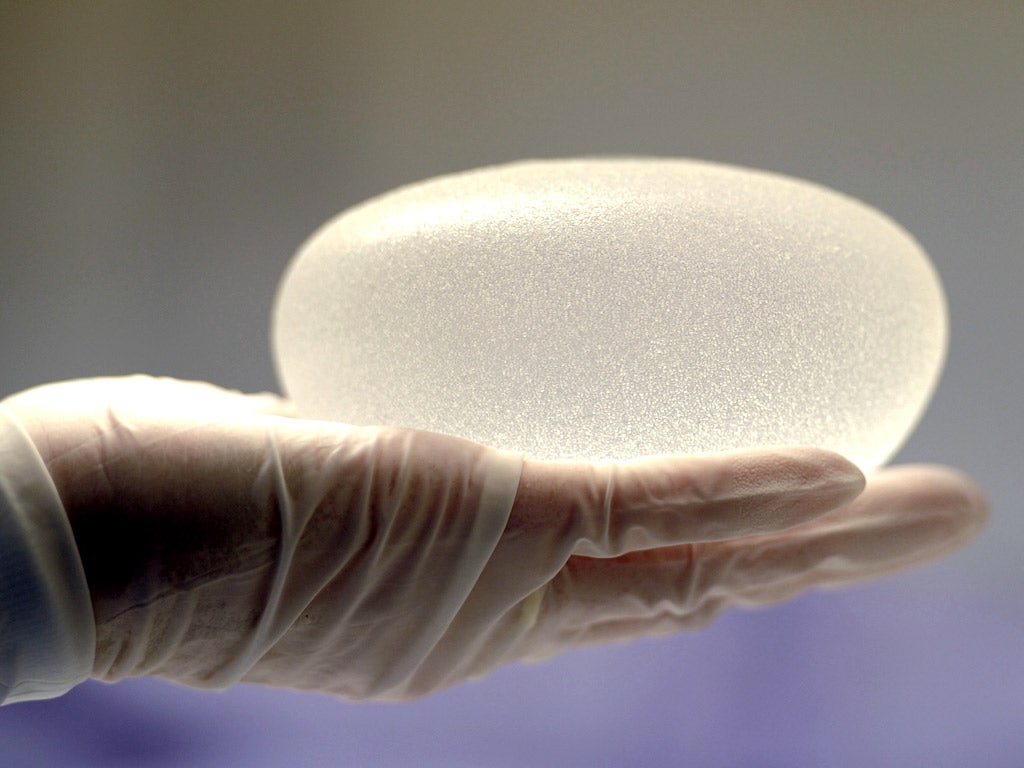Breast implants 'increase cancer death risk,' say scientists
Breast augmentations are now the commonest operation performed by pastic surgeons

Women who have cosmetic surgery to increase the size of their breasts may be at greater risk of dying from breast cancer, scientists say.
A review of studies published over the last 20 years found women with breast implants had a 38 per cent greater risk of death from the disease than women without. There is no evidence that breast implants cause cancer, but their presence may hide developing tumours when women undergo X-ray screening with mammograms so their cancer is more advanced when diagnosed.
The fashion for bigger breasts has fuelled a boom in breast augmentation, which is now the commonest operation performed by members of the British Association of Aesthetic Plastic Surgeons. The operation costs an average of £5,000 and accounts for almost a quarter of all procedures. More than 40,000 women are estimated to have had implants inserted in 2011, an increase of 56 per cent since 2007.
Most implants are filled with saline solution or silicone which are radio-obscure – X-rays cannot penetrate them – so they cast a shadow obscuring the breast tissue that lies behind them. Studies show that between a fifth and four fifths of the breast tissue cannot be seen. However, the presence of implants may make it easier to detect tumours manually by providing a base against which the lump can be felt.
Canadian researchers who conducted the first systematic review of 12 studies involving 1,000 women with breast implants who developed breast cancer found that they had a 26 per cent higher risk of being diagnosed late, when their cancer was more advanced.
Analysis of five studies involving over 600 women with implants who developed breast cancer – again, the first to be conducted – disclosed an increased death rate of 38 per cent.
The studies, published online in the British Medical Journal, were conducted in the US, Canada and northern Europe. The authors, from Quebec in Canada, warn that their findings should be interpreted with caution because of the small numbers and the possible presence of confounding factors. Other studies have found no link.
Despite these limitations they say “the accumulating evidence suggests that women with cosmetic breast implants who develop breast cancer have an increased risk of being diagnosed as having non-localised [advanced] breast tumours more frequently than women with breast cancer who do not have implants”.
Current evidence also suggests that cosmetic breast implants “adversely affect breast cancer specific survival following the diagnosis”, they add.
The British Association of Aesthetic Plastic Surgeons said in a statement: “As the authors themselves conclude, the results of this statistical analysis of previously published papers should be treated with caution.
“The study only demonstrates an association of reduced survival rate from non-localised (advanced) breast cancer in women with breast implants rather than a cause. The authors also quote many papers that show no association between breast implants and an increase in breast cancer.”
The statistics
40,000 Breast augmentations in 2011.
56% Increase since 2007.
26% Increased risk with an implant of being diagnosed late with breast cancer.
38% Increased risk with an implant of dying from breast cancer.
Join our commenting forum
Join thought-provoking conversations, follow other Independent readers and see their replies
Comments
Bookmark popover
Removed from bookmarks